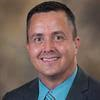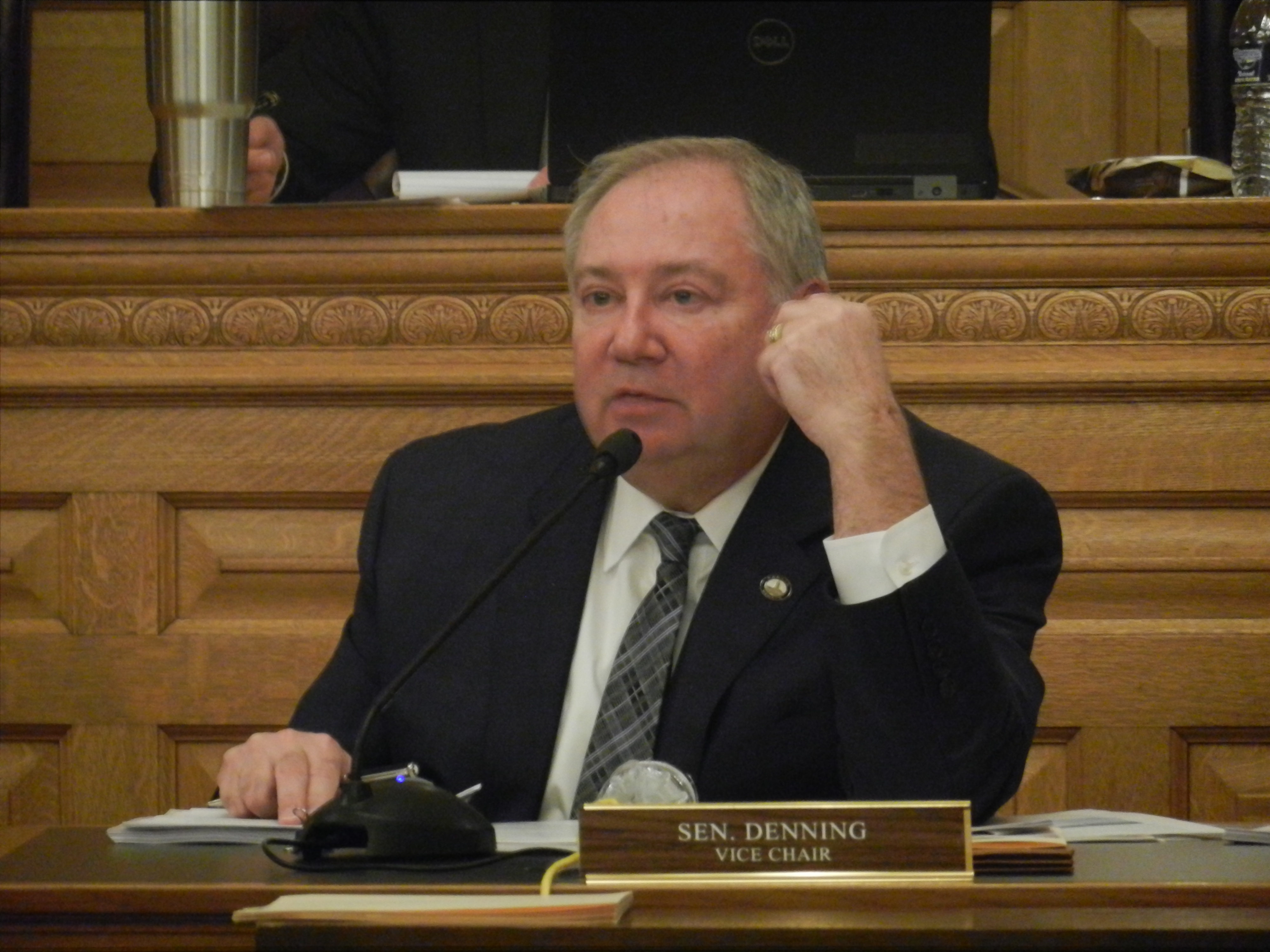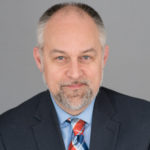The Senate plan to expand Medicaid is starting to fall into place, giving supporters hope that 2020 will be the year the Legislature extends medical coverage to an estimated 150,000 Kansans.
Led by Senate Majority Leader Jim Denning, the Senate has been crafting its own version of an expansion plan as an alternative to one passed by the House last session. The Senate didn’t act on the House plan. It wanted more time to work on an expansion plan. A hearing is set for Oct. 22.

Criticized for not moving expansion forward last session, Denning has put together a plan that would require a tax increase on cigarettes and vaping-related products to help fund a complex proposal for expanding Medicaid.
“We’re encouraged that the conversation is moving from whether we should expand Medicaid to what expansion coverage should look like,” said Chad Austin, lobbyist for the Kansas Hospital Association.
The Senate plan is taking shape at the same time that Gov. Laura Kelly has commissioned a task force to learn from the experience of other states that have expanded Medicaid.
Denning, meanwhile, has been reaching out to hospitals across the state to pitch his plan, which contains new ideas not previously discussed in Kansas that Austin said the association is still evaluating.

April Holman, executive director of Alliance for a Healthy Kansas, doesn’t have firsthand knowledge of the plan but is hopeful about getting Medicaid expansion approved going into 2020.
“I think the fact that someone in leadership is making what seems to be a strong push for this is very encouraging,” Holman said.
“We’re cautiously optimistic. We haven’t endorsed anything. There is so much still that needs to be understood about what the proposal is,” she said, “but we are encouraged that it seems like there’s going to be legitimate progress toward expansion.”

Republican state Sen. Gene Suellentrop, who has been working with Denning on an expansion alternative, said philosophically, he doesn’t believe the Legislature should undertake expansion.
However, he said the question is can the Senate stop the version of Medicaid expansion that the House passed last session.
“We think this is a better approach to expansion if we’re in a corner and if we have to do it,” Suellentrop said. “In order to get most of the right policy for this, we’ve got to prepare for an alternate.”
Suellentrop said he thought that former Gov. Sam Brownback’s failure to compromise on taxes led to the election of a Democratic governor.
“Sometimes, you’re not in a position where you want to do something, but you have to do something so you don’t get something worse,” he said.
The Senate plan seeks to expand Medicaid for people earning 100% of the federal poverty level, although it could go to 138% in certain situations.
The plan also would include a component encouraging Medicaid beneficiaries to work, but it is not a mandate like the ones being challenged in Arkansas, Kentucky and New Hampshire.
The Senate plan’s goal is to allow anyone earning between 100% and 138% of the federal poverty level — an estimated 30,000 people — to stay on the exchanges established by the Affordable Care Act while securing a 90% match for Medicaid expansion from the federal government.
The idea is to use the cigarette and vaping tax — estimated at $50 million — to fund a reinsurance program for companies offering insurance on the exchanges in an effort to bring premiums down by as much as 20%.
The plan will call for raising the tax on cigarettes by $1 a pack. The tax on vaping, which is assessed by the milliliter, will be increased in proportion to the increase on cigarettes taxes.
Denning conceded that lawmakers have become so angry over the vaping news in recent months with the emergence of serious lung illnesses that the vaping tax might end up being even higher than what the Senate plans to propose.
The reduced insurance premiums under the Senate plan could lead to less federal spending — fewer tax credits for health insurance payments, for instance — and potentially increase enrollment, which could contribute to lower insurance rates for anyone on the exchanges.
Reinsurance is intended to reduce premiums by protecting insurers on the exchange from unpredictable and extraordinarily large claims.
Ultimately, Denning’s plan is intended to keep all patients from being priced out of expensive and high-deductible plans sold on the exchanges.
Denning said the Senate plan is different from what failed in Utah or Idaho, two states that wanted to expand coverage up to 100% of the federal poverty level but had their plans turned down by the federal government.
The Senate plan, he said, is designed so it saves the federal government money with the reinsurance program, which will drive down federal subsidies as the insurance rates decline.
Denning hopes that by keeping the program revenue-neutral to the federal government, the state will get the approvals that Utah and Idaho failed to obtain for their plans.
“Utah and Idaho, they didn’t make it budget-neutral to the federal government,” he said.
Denning said the Centers for Medicare and Medicaid Services has signaled they would like states to take an innovative approach to expansion.
Matt Salo, executive director of the National Association of Medicaid Directors, confirmed that parts of the Trump administration had indicated it wanted new and different approaches to expansion.

“I think there are some parts of this administration that were very clearly signaling a receptivity to innovation,” he said.
However, the highest levels of the administration at the White House and the Office of Management and Budget have different ideas, he said.
The Department of Health and Human Services and the Centers for Medicare for Medicaid Services both indicated they wanted to work with states, he said.
“But when it got all the way up to OMB and at the White House, that’s where it got absolutely killed and where it became clear they were not willing to be flexible in this very significant area,” he said.
The administration, he said, is more invested in the ongoing lawsuit brought by 18 state attorneys general challenging the constitutionality of the Affordable Care Act.
It’s also worried about the potential domino effect of allowing other states to expand for something less than 138% of the federal poverty level and how that might influence states that have already expanded.
“If Utah came in and said we want to do the vanilla expansion, this administration would say yes because they have to. There isn’t any discretion. It’s clearly allowed under the law,” Salo said.
“But when a state comes in and says we want to get a waiver to do something different, that gives this administration the ability to say no for whatever reason,” he said.
Salo said the administration has shown a willingness to be innovative on issues such as the work requirements now challenged in court.
“When it comes to partial expansion, which is so clearly what a lot of red-state governors and red-state legislators wanted, it seems pretty clear that’s just a nonstarter,” he said.
Denning said the Kansas plan would flush out the Trump administration’s true intention with expansion, adding it would be “talking out of both sides of its mouth” if the plan was denied.
If the Trump administration doesn’t approve the reinsurance program, the plan would then allow Medicaid beneficiaries earning from 100% to 138% of the poverty level to decide whether to stay on the exchange. The second approach would still seek a 90% federal match.
If the government rejects that idea, the state would expand up to 138% of the federal poverty level.
Denning said the plan calls for sending all three proposals to the federal government at one time to avoid a delay in getting Medicaid expansion approved for Kansas.
The Senate plan also will include what is called a “pathway to employment,” which is intended to connect Medicaid beneficiaries to jobs.
It is not a requirement like the ones now being challenged in Kentucky, Arkansas and New Hampshire.
Able-bodied Medicaid beneficiaries will be asked if they work when they sign up for Medicaid. The questionnaire also will ask the unemployed beneficiaries what’s preventing them from working.
The information will be forwarded to the Commerce Department, which will connect beneficiaries to jobs or provide them the resources to get a job.
Completing the questionnaire will be part of the eligibility process, Denning said. There would be no penalty for not taking a job.
A work requirement would only stymie the ability to pass Medicaid expansion, he said. Not only is it unpopular with the Republican caucus, he said, it would be costly to administer and invite a lawsuit.
“Everyone thinks the Senate is going to come in with this 20-hour minimum a week work requirement,” he said. “We’re going to come in with this pathway to employment.”
Meanwhile, Denning has been working on a plan that’s intended to fund the program without relying on general state tax dollars.
Medicaid expansion is expected to cost about $1.1 billion a year, of which $121 million would be the state’s share, Denning said.
The Senate plan uses about $63 million from a 5.77% tax largely paid for by the managed-care companies that administer KanCare, the state’s privatized Medicaid program.
The plan also calls for the hospitals to develop a surcharge they would pay that would generate $31 million for expansion. Details of the surcharge are still being worked out.
The plan also would use an estimated $23 million in savings from beneficiaries now in the current Medicaid program, which is matched at 60% by the federal government. The state will see savings when they move to the new program matched at 90%, he said.
Denning also is proposing extra benefits for Medicaid beneficiaries who undergo wellness exams or take other preventative health care steps.
Healthy behaviors would be rewarded with enhanced dental care, subsidies for child care or over-the-counter drugs.
“The healthier they are, the less expensive they are to the state,” he said.
Denning’s plan also would include a provision that would prohibit the state from discriminating between profit and nonprofit companies that bid on the state’s KanCare contract in the future.
It also would require companies that win the KanCare contracts in the future to offer plans on the exchanges.
















